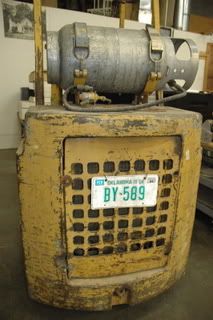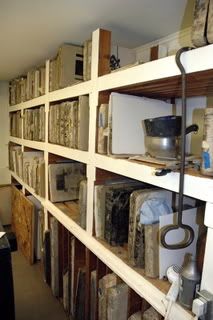
The forklift at the studio has Mr. Goldston's 1984 Oklahoma tags on it. You might not be the butt of any Oklahoma jokes - but I would be shocked if you weren't. I have to admit, Oklahomans must seem pretty peculiar to this crowd.
Not much visual aid this week, or rather, what there is has little to do with the text. Suffice it to say I've been much busier and involved in the goings on at ULAE, so photography takes a backseat, and you get tasty leftovers that I couldn't fit in previous blogs.
It might be advantageous to discuss a few things I've noticed about this place, and the art world at large. I will try to keep this as positive as possible. Becoming more involved has led me to realize what a blessing an art related job such as this can be. If there is any single thing I have learned from this experience it is that there is life beyond art school. One simply must know where to look, and be willing to pay one dues. Certainly, this won't put anyone on a faster track to making it big as a visual artist, but it depends on how you use the facilities at your disposal, and put what you learn as a printer to use. The level of professionalism exercised at this shop has forced me to work on my own precision and attention to detail. It has effected the quality of my own work immensely, and my attitude towards art making in general. Then of course there is the development of new skills and familiarization with new aspects of the trade - but this will take years. Many printers here have a specialization, but broaden into other areas out of necessity in producing large editions of a certain type. Just in standing by and being a nuisance I have gotten a crash course in litho, aquatint, intaglio, and photogravieur. As I understand it, every studio has it's own methods in each area, so it isn't surprising that they do things differently here than at Gemini, or Tandem (or OK State).

A pile of broken lithographic stones sit behind Skidmore Place.
The downside of course is that the pressure is immense at times, and putting any of this knowledge to use in personal projects might be hard to do. Deadlines on large editions change at a moments notice, artists drop in to check on their work, or to create new work, and the level of craftsmanship cannot falter due to shortage of time. There is a lot of money involved here, so keeping it cool and staying focused is important. Things must be done right - and there is an enormous number of variables that ensure that things will go wrong. I have already noticed a decrease in my enthusiasm, though I chock most of it up to being the intern, and wading in the muck at the bottom of the heap. Some days I feel like a printer, and am treated as such - and other days I am DEFINITELY the intern. I am constantly reminded of my place. The other thing that I picked up on rather quickly is that many of the people who work here commute and hour or an hour and a half and the beginning and the end of each day. I thought at first it was just stubbornness - insisting to live in Brooklyn because of the cool factor. But I can honestly say that I never want to live on Long Island again in my life. There is no one above high school age or below mid forties that lives here as far as I can tell, and thus there is very little to do. I find myself, as well, living for the next chance to get into Manhattan or Williamsburg or Park Slope. So - if the printers seem grumpy, just imagine yourself in their position. It's a great job, but it is also a lot of baggage and stress.

A shot from the front room of Skidmore. On a nice days, Skidmore can be a lovely place to be.
It can be tremendously rewarding some days, and other days it can make you feel like dirt. I guess this aspect of being a working stiff has always eluded me - and I can honestly say I miss college a lot already. However - it has been a huge eye opener as to how the art world works, and as to what goes on behind the scenes. One printer said that he went to to Met to see the new Jasper Johns "Gray" exhibit, which featured many prints that he himself had pulled and handled. However his name is nowhere on that sheet of paper. Only Johns'. Not surprisingly, most of the notable artists who work with ULAE haven't set foot in Bayshore in years, but still have their prints editioned here. Is it right or wrong? I don't know - it just is. I know that part of the thrill of making prints for me is actually making the prints. I like to be involved in every step of the process - but I am not a famous artist, and if I were I can hardly say that I wouldn't let ULAE edition my prints for me and sell them for big money. I can't say it doesn't sound appealing. It is still awe inspiring to be in the presence of such history and legacy - but if I hadn't come out here to do this I may never have realized that such a place existed. I always thought the art and the artist were inseparable - as naive as it sounds - but it makes complete sense that the thing that can drive the two apart should be the almighty dollar. I might sound jaded - but I'm totally comfortable with it - not that it's up to me. It's just been a real eye opener. Strangely though - this awesome opportunity has really helped me reconcile with my decision to go into the arts. It is always breathing down my neck - what comes after school? Do I really expect to make a living on paintings? In a culture driven by media, fast news, flashing lights and dwindling attention spans, do I really expect to get anyone's attention? The average time a gallery goer takes to look at a painting is less than 3 seconds. The art world is subsequently very tough and fickle, and riddled with nepotism and politics - and all of these things should inform the student of the arts about the path before him. While there is a strange, naive comfort in being the penniless underdog, sticking to his genuine artistic ideals and creating meaningful but misunderstood work only to be praised after his death - seeing what these printers do gives me a great deal of hope and optimism. I can see myself in a job like this one day, becoming a master of a respectable trade, and living off of it in order to feed myself while kicking the dream around. There is one printer here who I relate to on this level - and he uses all of his time outside of the studio to create his own work. He makes use of the facilities at Clinton, and produces really nice work. I see this as an admirable use of his occupational situation - though the trade offs are great (he resides in Bayshore) he is still on track to a career as a professional artist. Being close to NYC with a stable income is a tremendous asset to this goal, because if there's one thing NYC has, it's money, where there's money there is much more likely to be an art market. Culture is one thing that New York is not shy of - and for a county boy like me, that's real derned excitin'.

Studio at Skidmore is like a litho library documenting the presence of people like Motherwell, Frankenthaler, Dine and Oldenberg. The litho images of their work are, by and large, untouched.
For a great bit of history and an awesome photo essay about ULAE - make sure to check
out their new website: http://www.ulae.com
1 comment:
I was a ULAE intern back in 1993. I stayed at the Watts St. studio when they still had it... I have to say, Bill Goldston was, frankly, a dick to me, and his wife Ricarda was a nightmare. Holy Crap was she a piece of work. Photos of the two of them in the throes of coitus showed up, and were eventually stuck in one of the cookbooks at Skidmore. I worked with some really great people there, though- Bruce Wankel, Craig Zammiello- great guys. Also Frank D'Agostino was a riot to be around. I hope you get to see as much of Manhattan as I did! I also hope the intern has a car- there was a great little red car there, until a girl named Stephanie got hold of it. I drove the intern car all over L.I.. Favorite place in LI- Amityville horror House!
I learned more about printing from Mark Sisson than Bill!
Post a Comment